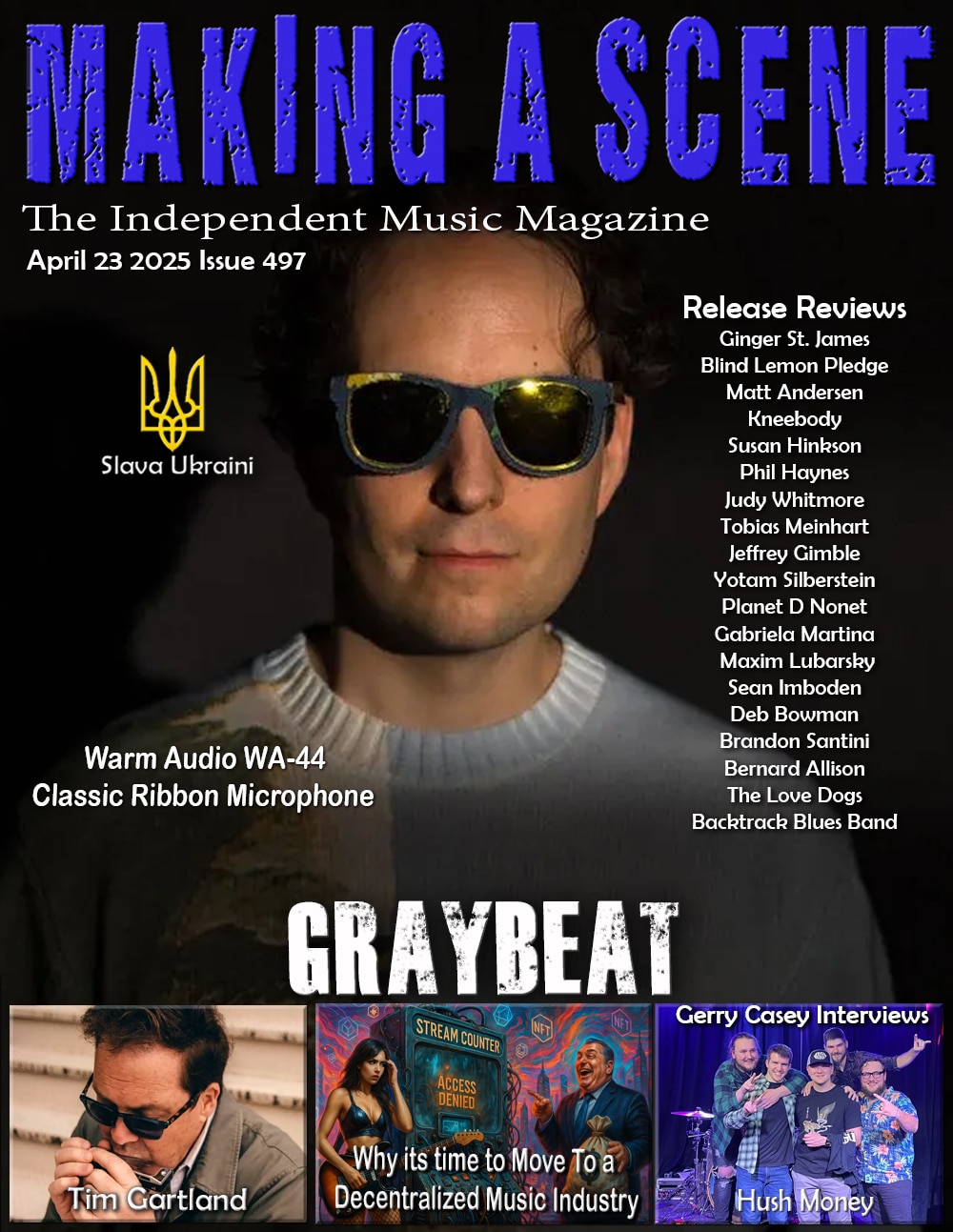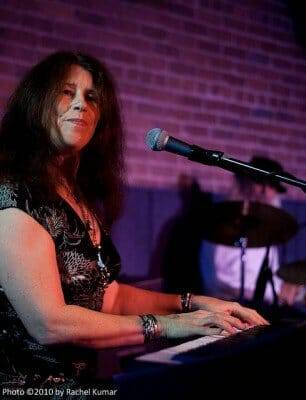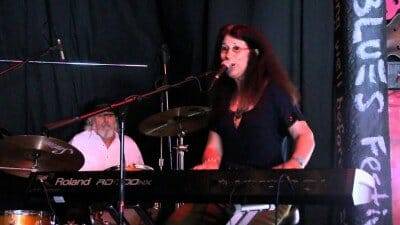An Exclusive interview with Wendy Dewitt!!
An Exclusive Interview with Wendy Dewitt! by Richard Lhommedieu on Mixcloud
Throughout a career that included touring the United States and Europe with rhythm-and-blues legend Hank Ballard and nearly a quarter century at the helm of a powerhouse blues combo called Blue Saloon, boogie woogie and blues pianist and vocalist Wendy DeWitt always worked with a bass player, except when doing the occasional solo piano gig. Then one night when her bassist didn’t show up for a club engagement in San Francisco, she discovered she didn’t really need one.
“Her left hand is as good as any bass player I’ve ever worked with,” veteran drummer Kirk Harwood says of her bass patterns. Noted for his stints with Clover (a band fronted by Huey Lewis that also included future Doobie Brothers guitarist John McFee), harmonica virtuoso Norton Buffalo, and slide guitar great Roy Rodgers, Harwood has been performing with DeWitt in a duo format for the past three years.
The remarkable empathy DeWitt and Harwood have developed is evident throughout Industrial Strength, DeWitt’s seventh CD on her own Wette Music label and first with the drummer. The two are featured on the disc as a duo, as well as in the company of guitarists Dave Aguilar, Steve Freund, Anthony Paule, and Tommy Thomsen, tenor saxophonist Nancy Wright, cornetist Macy Blackman, and tuba player Marty Eggers. There’s not a bass player in the bunch.
Of the CD, which is made up of nine original songs by the pianist and engaging treatments of the standards “Summertime” and “Lucky Old Sun” and boogies by Albert Ammons and Little Brother Montgomery, Robert Feuer of Blues Revue magazine has written that DeWitt “exhibits a complete mastery of her instrument, solidifying her place at the top of the list of female boogie woogie piano players.”
DeWitt was born in San Francisco and grew up north of the Bay Area in Napa and Sonoma counties. She began “messing around” with her parents’ piano when she was 4 and took formal lessons during her tenth and eleventh years. Her most important lessons, however, were the informal ones she got from a friend of father’s, Western swing Hall of Famer, singer, guitarist, and pianist Tommy Thomsen.
“We lived in an old stone building that had a balcony that overlooked downtown Glen Ellen,” DeWitt says of a tiny town near Sonoma. “Tommy played at a notorious bar across the street called the Rustic Inn. I’d hang out on the balcony and listen to him, and then he’d come over to the house for parties and play.”
Besides Thomsen, other early influences on DeWitt’s piano style include Speckled Red, Memphis Slim, Otis Spann, Sunnyland Slim, and the ‘big three” of boogie woogie: Albert Ammons, Pete Johnson, and Meade Lux Lewis.
“It just was fun,” she says of boogie woogie’s appeal.
At age 21, after playing solo gigs around Sonoma County, DeWitt moved to Santa Barbara and joining a Top-40 band, toured the U.S. for two years. “I became a professional musician in the process of doing that, but I always wanted to play blues songs,” she reflects. “I never got the popular music model, but it was a great training ground. You had to really develop your ear and your chops and different approaches to playing and go out and do it four or five hours a night six nights a week. You worked.”
Back in Northern California, she played in bands with Larry Lynch (Greg Kihn), and Applejack Walroth (Boz Scaggs, Elvin Bishop) before launching Wendy DeWitt and Blue Saloon in 1986. The band became a popular attraction at clubs throughout California and also appeared at the San Francisco and Monterey blues festivals. She also has collaborated with Chicago blues guitar great Steve Freund (she in his band, he in hers) and performed during the late 1990s at Boston Symphony Hall and the Blues Peer Festival in Belgium, among many other venues, with Hank Ballard and the Midnighters.
“Hank was a very sweet person,” she reflects. “When you’re playing songs you’ve heard all your life with the person who created them, it’s a whole ‘nother vibe.”
For the past dozen years, DeWitt has presented an annual show called Queens of Boogie Woogie at Yoshi’s in Oakland. Participants have included Sue Palmer, Dona Oxford, Lisa Otey, and Annieville Blues. “Big Joe Duskin and Mr. B. have been queens, too,” DeWitt notes. She also does occasional shows called Blues Piano Orgy with Bay Area pianists John Allair, Steve Lucky, Sid Morris, and Bob Welsh.
Kirk Harwood was born in Kansas City, Kansas, on December 2, 1949, and lived in a Chicago suburb between the ages of 5 and 12. He took up drums at 15 after the family moved to El Cerrito, California. His early favorites included Joe Morello, Buddy Rich, Art Blakey, and Jack DeJohnette, and he studied for three years with Benny Goodman drummer John Markham.
Through John McFee, an associate of Harwood’s neighbor Norton Buffalo, he was recommended in 1974 to fill the drum seat in Clover, with which he spent a year and a half performing in California and Nevada.
“My foot was in a cast,” Harwood recalls about the Clover audition. “I didn’t figure I had much of a chance, but they hired me anyway.”
After leaving Clover, he spent two years with Norton Buffalo (with whom he made two albums for Capitol Records) and two more with Roy Rodgers. And for the past 35 years, Harwood has played on and off with Tommy Thomsen’s Western swing band. On a gig with Thomen six years ago, DeWitt was the pianist. For a later engagement many miles away from the Bay Area, Thomsen suggested that Harwood and DeWitt ride together in order to save on gas.
“We had a wonderful conversation on the way up and on the way back,” the drummer remembers.
The two friends played their first engagement as a duo three years ago in Berkeley and have been doing so ever since. Sometimes they hire a guitarist or a saxophonist to join them, as they do on Industrial Strength, but very rarely a bass player.
“Kirk is such a creative drummer,” DeWitt says. “In the context of a duo, we both have room to back off or fill the sound up. It gives us a lot of flexibility.”
“It’s a lot of fun and a lot more freeing,” Harwood adds. “It kind of frees me up to do more innovative stuff. I just have one person to communicate with music-wise, rather than trying to do it with two or three others. It’s just Wendy. I can put all my attention on her and what’s she’s doing and play off of that.”
Their flagship performance as a duo in Berkeley led immediately to romance after DeWitt invited Harwood back to her place for a drink when they finished.
“We’ve been perfecting the duo thing ever since,” he says. “It seems to be working out really good.”
Recordings include :
Industrial Strength
Fortunately, I just got turned on to Industrial Strength, the latest release from Wendy DeWitt and Kirk Harwood (and a few of their friends), which is full of Texas/Chicago boogie-woogie at its best.
~ Max Bartholomew
Take a Little Walk With Me
“ Heavyweight guitarists such as Steve Freund and Dave Workman will attest to Wendy’s extraordinary ability at the 88’s, as did the late Rock & Roll architect, Hank Ballard…Wendy’s vocals are natural and unaffected, …her piano work is of the first order…”
~ Sean Carney, Columbus Blues Review
You’re Not There
“ ..DeWitt is a sweet-voiced chanteuse with a strong reliance on jazz phrasing and inflection. Her piano style is based on those of Otis Spann, Albert Ammons and other blues masters, and she tears it up on the closer, “Chupacabra Boggie Woogie”…”
~ Bob Cianci – Blues Revue
Discover more from Making A Scene!
Subscribe to get the latest posts sent to your email.



















































